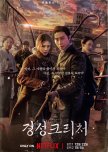
In its monstrosity hardly dealt with war crime pulled off the dusty shelf in vividly stylized mode
The Netflix production “Gyeongseong Creature” turns out to be quite an idiosyncratic mix. Studio Dragon had the opportunity to experiment and make full use of an illustrious cast. Despite some clichés, "Gyeongseong Creature" is not a banal K-drama that you quickly forget.Basically it's another hero´s quest of some hero against his will, discovering unexpected sides of himself. It´s another ´mission impossible´ right into the lion's den - in this case: the military hospital of the Japanese colonial army base in the middle of the capital of the Chōsen colony in 1945. It is not the fair maiden who is to be saved, but the kidnapped, impregnated courtesan of the chief of the Japanese police. It turns out that a 'dragon' - in this case an artificially created monster - also has to be overcome along the way. The hero is flanked by a motley crew of long-standing and spontaneous companions...
Now this old wine comes in a freshly spiced-up Korean-style bottle. The personal touch of "Gyeongseong Creature" is precisely that Gyeongseong in those final months of the Pacific War, when Seoul bore that name. The historical setting as well as the historically and socially significant issues of Japanese colonial rule give the plot its selectivity and a quite serious foundation, so that "Gyeongseong Creature" does not simply offer interchangeable run-of-the-mill entertainment. Here, a painful chapter of South Korean suffering is intertwined with personal fates in the form of loosely interspersed critical events during colonial rule that is officially (by Japan) to this day preferable neglected, not to mention rehabilitated. With this Netflix production it has been nonchalantly thrown onto the World Channel to be proclaimed and acknowledged in HD.
This involves in general: the arbitrary racist violence and oppression against the Koreans as well as the systematic torture and execution of suspected resistance fighters in Sodaemun Prison; the forced military conscription and bullying of Korean soldiers within Japanese units; the forced recruitment or abduction of comfort women for (mass rape for the pleasure of) frontline soldiers... And specifically in the case of this story: the monstrous machinations of Unit 731 as part of the Imperial Japanese Army, which went down in history for its inhumane experiments on human subjects. Although these experiments actually took place mainly in Harbin in Manchuria (see side note below), they were for this KDrama also imported to Gyeongseong for a compact narrative stringency.
Against this background, "Gyeongseong Creature" tells its fictional story with artistic license. In some scenes you may get the impression that you have lost your way in a parody. Despite of such incomprehensible human menace and distress, the story presents itself at times completely unimpressed by any seriousness. There is room for humor and coolness, (which sometimes made me think of a parody of 'James Bond' or alike production). There is this reluctant hero who sometimes appears naive, sometimes quite cheeky and self-confident. He´s someone who has learned to achieve his goals, but who prefers to stay out of any trouble, wearing a stylish suit. And then, out of nowhere, he can withstand torture and injuries as if it were nothing at all. You can't really take this seriously. And yet...
In contrast, there is plenty of objective seriousness and expertise from the two foreign travelers on their detective mission. Pleasant extra: a clever, self-confident FL who is quick-witted in every respect.
In contrast, there is also the extremely dark world of medical experiments (and their artistic documentation) – underground on the military site.
In contrast, there are also the monsters, the army and the imprisoned test subjects.
And in the middle of the perfidious chase, the great feelings of humanity shine through: familial bonds and solidarity as well as wounded pride and jealousy act as driving forces, flanked by patriotic resistance and questionable scientific ambition. It's hardly surprising that Cupid also shoots his arrow in passing.
Not only do the individual characters at times feel like caricatures of themselves, Gyeongseong's production, choreographed in light and colors, also seems to come from an unreal fairytale world. While the pawnshop shimmers in all colors, the Japanese research laboratory is stylized as a dark dungeon beneath the military prison. And then there is the Moonlight Bar on the one hand and the police chief's property on the other - each of them control centers with a certain (political) impact. All of this is impressively aestheticized again and again in hand-picked scenes and settings. Sometimes you can feel like you're in the theater and then again like you're in the high-resolution digital world of a computer game.
So is the KDrama worth watching? On the one hand, "Gyeongseong Creature" takes itself very seriously with regard to its historical contemporary themes, but on the other hand, in the clichéd exaggeration of the individual characters, it apparently doesn't. This KDrama mix chosen for "Gyeongseong Creature" is, in my opinion, quite daring. However, I mean this in a benevolently positive way, in the sense of 'feeling free to experiment'. You might have to get used to it - but easily so. The (let´s say) rather 'banal' entertainment element - the Mission Impossible in view of the numerically superior Japanese military and the monster creation - is effectively intertwined with painful historical reality in a strikingly piquant and catchy manner. During the action-packed and visually stunning ride through the episodes, the KDrama subtly but consequently throws its barbs of memory at the audience.
The KDrama surely is offering cinematically solid entertainment with a star cast, but at the same time, based on the different personal backgrounds of the main and supporting characters, it demands acknowledgement of how the Japanese dealt with Koreans at that time. By stylizing the manifestation of Unit 731's monstrous experiments and research in the form of a concrete monster with superpowers, "Gyeongseong Creature" symbolically brings the unsatisfactorily dealt with war crime off the dusty history shelves in an unmistakable monstrosity.
...
Well, a second season has already been announced.
This will obviously be set in contemporary Seoul, though. We´ll see...
---------------------------------------------------------
SIDE NOTE: --- Unit 731 of the Kwantung Army of the Imperial Japanese Army ---
From 1932 onwards, Unit 731 of the Kwantung Army of the Imperial Japanese Army under the leadership of Ishii Shirō was stationed in Harbin, the largest city of the puppet state of Manchukuo in northern Manchuria. Around 3,000 mostly bacteriologists carried out experiments on living people there. The test subjects imprisoned and tortured there were predominantly Korean and Chinese civilians as well as Soviet prisoners of war. Later, including American prisoners of war, too.
Unit 731 of the Kwantung Army of the Imperial Japanese Army was disguised as the “Main Branch of the Epidemic Prevention and Water Supply Department.” In fact, Unit 731 in Harbin is responsible for the most cruel experiments on living humans. Later, field research was also carried out using the biological weapons developed in Harbin. The victims based on this research alone were mostly civilians - tens of thousands came together over the course of the war years.
I would like to ad that the main perpetrators of these war crimes by Unit 731, who had the full support of the later Japanese prime ministers and the Japanese imperial family, remained unpunished in exchange for the research results that they handed over to the USA...
PS:
There was no offshoot of Unit 731 in the fictional Onseong Hospital in Geyeongseong. That's fictional.
There was no Onseong Hospital in Gyeongseong either.
However...
---------------------------------------------------------
SIDE NOTE: --- Gyeongseong Japanese Military Hospital ---
The main KDrama setting is a colorful look and feel of Gyeongsong (Seoul at that time). The focus is on the architecture of the Republic's former Defense Security Command Center. On the area between the palace and the old town of Bukcho a military hospital was built by the Japanese in 1928. The Onseong named Hospital in "Gyeongseong Creature" is fictional, but the architecture that takes center stage is in fact related to a real Japanese military hospital before later actually becoming part of the Republic's Defense Security Command Center.
Until about two decades ago, this area was an urban area closed to the public and with bad memories for the people - not only of the activities of the colonial rulers, but also of their own military, which staged a coup against the people here in the 1970s. Furthermore, many South Koreans were tortured and mistreated there (by the security officers of South Korea's dictatorial regime). Until recently, human rights was an unknown concept behind those walls.
The ensemble could have been demolished, but the people decided to preserve the building as a memorial. The historical witness is now part of the National Museum of Modern and Contemporary Art. The bloody past is thus being countered with something positive: the imagination and emotional power of modern art.
Here, with the KDrama "Gyeongsong Creature", the dark past of this military area bearing a bloody and painful past, which began with Japanese colonial rule and was later continued by South Korean government officials, comes to life again with artistic license, too - as representative contemporary witness in HD.

Not world-shaking at all, though it can be quite witty at times
It's about a vampire who wants to become human. However, fans of vampire stories alert! "Heartbeat" is at best Vampire-'light'. First and foremost, this is ´Rom´ with double ´Com´. It is casual entertainment, its topping made of tried and tested patterns, and clichés, too.Essentially, "Heartbeat" thrives on the special relationship dynamics between the two protagonists, with a rather intractable young woman crashing into an old vampire, who has been robbed of his supernatural powers/resources and who, due to a mishap, is now neither really vampire nor human. The humor and charm of the story lies in this somewhat awkward constellation. Determined female protagonist meets bewildered, somehow lost within identities male protagonist. The whole story is embedded in a stylish, handsome ambience as well as this and that (four-dimensionally knitted) subplot. Romantic vibes are guaranteed and on top of that a bit of suspense, too.
"Heartbeat" isn't world-shaking at all, though it can be quite witty at times. It's fun when you're in the mood for it. With a down-to-earth female protagonist whose everyday life (for a pleasing change) is not predominantly structured by wardrobe and make-up.
Here and there, however, production obviously chose the striking to the logical: No money but the large property always in festive lighting? The protagonist's gothic chambers always bathed in the candlelight of countless candles, regardless of whether he is there or not? (And who would be in charge of this? He never has to light it up, nor blow it out when he leaves... they are always burning.) Well. Ok, let´s not nit-pick…
"Heartbeat" obviously doesn't take itself too seriously when it comes to such details. If you can overlook this and that, then it´s fun@work... as fun and light entertainment are clearly the goal. So, don´t expect more than that.
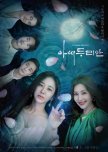
RomCom, crime, historical drama, fantasy & Makjang make the dough for something standalone new
"Durian's Affair" is set among the wealthy - ´here´ (2023) and likewise ´there´ (long gone Joseon days). The time may have changed for Du Ri-an and her daughter-in-law, but the place has not. They are instantly catapulted from their Joseon days to recent today. Some of the wealthy family, who own the property today, have apparently reincarnated again in this family. They are especially well known to Du Ri-an. Now those involuntary time travelling ladies have to deal with the culture shock and the traumatic leap in time that actually seems as incredible as a dream, whereas in their own days they were actually in the midst of grieving over the loss of their beloved son/husband...This bizarre, four-dimensional dramaturgical setting is providing a load of finely knitted entanglements and arising questions, yet unanswered. What had really happened back then? What's going on today in this family? Why the time jump? So what's next for the two Joseon-day ladies? How is everyone going to deal with this weird practical (and for some even emotional confusing) situation?
This production is full of zeitgeist of the 2020s, in which Anglicisms and Banmal (informal speech) are a matter of course, while in mass consciousness the curtain between different times and spaces has become extremely permeable. Yet, the icing on the cake: relationship dynamics in the fourth dimension. The people of that long gone time are not those of today. And yet... There are notions of their life back then, even if they cannot consciously remember it, as well as the option of making new decisions in their life today. Broken hearts, cupid's arrow, greed and passion, as well as a sense of responsibility or noblesse oblige... it's all mixed up through the perspective of the time-travelling ladies of days gone by. Situation comedy breaks through encrusted structures. The strangely insane is tossing and turning the minds of reincarnates and time travellers alike. Likewise, the strangely familiar is, too.
"Durian's Affair" is one of those KDramas that wants to break with established genres. The South Korean, but also the international market is currently being flooded with excessive KDrama productions. Thus there is increasingly space opening up for experiments... and that's what “Durian´s Affair” is, too. This KDrama is no RomCom, no crime thriller, no historical drama, no fantasy and also no classical Makjang. However, elements of each are richly included. Together they create something independently new. Anyone who is open to such an experiment should sit back, relax, shake off the usual expectations and get involved with the KDrama. It's entertaining. With some open questions that keep the suspension throughout all 16 episodes. There are also love interests. (Yes, plural.) All multi-layeredly entangled across time and space. Additionally, “Durian´s Affair” is even exuding a pleasant scent of humanness.
Be prepared for deliberate Sostenuto! The pacing is characteristic, since the production sticks consistently with the two outdated ladies from Joseon days. And in my opinion, those ladies are the ones who make the show as remarkable as it is. Regarding Du Ri-an and her daughter-in-law, all characters in the show as well as the audience alike can work themselves off. Nice!
----------------------------------------------------------------------------
SIDENOTE: --- A reckoning with the lost virtues of a conservative South Korean society ---
“Wheresoever you go, go with all your heart.” -Confucius
In my opinion, "Durian's Affair" is kind of a reckoning with pseudo-virtues of a conservative South Korean society. Du Ri-an and her daughter-in-law are catapulted into Seoul 2023 and show the elite clan around the Dan family what true Confucian virtue actually means. At the same time, they are caricatures as those virtues come along as an almost unattainable ideal. The two ladies from back then embody i.e. propriety, righteousness, integrity, benevolence, wisdom and trustworthiness in such an uncompromisingly consistent way that one cannot help but be amazed. Confucian virtues are inextricably linked to patriarchy. But the lesson in this idealistic self-image of a dignified, respectful life is given to us by two women! Adaptably creative, intuitive, respectful and well grounded. Timelessly human, righteous, wise and trustworthy.
Du Ri-an and her daughter-in-law embody the Confucian virtues, but more than that, they have transcended them without realizing it and found an answer for what these (and every other virtue, too,) are actually intended for: A source of self-confidence as a human being and dignity, from which a person can draw strength and grounding - even in the most adverse situations! In general, this as a prerequisite for any human, compassionate, authentic encounters. Those virtues had to be (necessarily, involuntarily) adapted by those ladies into a completely foreign century. (And they prove themselves again and again in every one of the three different households of the Dan family.) So it is actually about the core essence of any virtue: providing a human being with dignity and inner values as a compass – reaching out with the power of respect and thus transcending boundaries of specified classes, too.
The two time travelers come across as idealized caricatures of the bygone Joseon period, that is generally considered virtuous. As foreign ladies in Seoul 2023, they embody rather unreal, almost exaggerated ideals of virtues that are still upheld and (as it turns out) actually largely lost. And yet, the two ladies prove it: true, authentic dignity can grow from the upright embodiment of these virtues. This dignity matches its dramaturgical equivalent in the overall deliberate Sostenuto pacing of the K-drama.
The timelessness of the old values stands in apparent contrast to the growing western internationalized coolness and the elitist arrogant version of the new nobility, which however seems to have lost any grounding unless it is for money. It is rather obvious: a bit more humanness, morality, integrity, wisdom and trustworthiness would be nice here and there. What is offered above all is a shiny facade cushioned by the bank account. More or less covered underneath you find any human topic irrespective of class or wealth: longing to be loved, self-doubt, jealousy, gender issues, fear of aging, love in old age, temptation...
In "Durian's Affair" the head of the family clan may be a (actually surprisingly liberal) woman. Homosexual love can become a topic here, too. And then there are a few more time-sensitive issues in play. Yet, authenticity and sincerity are primarily triggered by the two noble, upstanding Joseon ladies... They may remind one or the other just by their attitude towards life, that human dignity is deeply rooted inside - even though one may have lost or forgotten about it along the way.
Don’t get me wrong. I'm not standing here for Confucian virtues. And neither does the KDrama. But it holds a nicely presented mirror to South Korean society, which to this day may hide behind the 'old, time-honoured' values. For better or for worse. If so, then it might be crucial to fill these virtues with life. Message: The present is far from that. Fascination? Yes. Attraction? Perhaps. But embodied? No. Two ladies from the past must be landing in 2023. (And actually they had to carry their baggage at home back then - a baggage whose weight was characterized by a questionable virtue (also) of the people of that distant time.)
“Durian´s Affair” rejects any kind of idealization. How nice, indeed! Yet it upholds authenticity (as a new and needed virtue?), basic for any respectful human-to-human encounter. As a value! As the true virtue! And with that - against this background - "Durian's Affair" becomes quite a progressive KDrama production. What a delightful surprise!
PS:
And then, the ending. It is open for all you can imagine. Any direction. You choose, where to go next. Drama just like the human condition (la condition humaine.) Like the wheel of existence, fueled by Karma! It goes on and on... A never ending story of birth and rebirth...
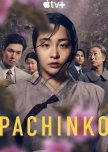
Not a KDrama, but a dramatic Korean story with a lot of Korean heart. (A hybrid?)
Ok, this series tells a Korean story, it´s about Korean destinies. BUT it's not an original KDrama. It is a (western) Apple production in which some (Apple) producers from the US obviously had a say. So, first of all, a bit of criticism about the American serial adaptation of a bestseller novel, which 'coincidentally' has a Korean fate as its subject. (Before I go into praise...)North Americans with Korean family backgrounds may have been involved in the production (the directors, the person responsible for the script adaptation and a lot of actors, for example). Nevertheless, it is and remains a North American production. The sad thing about it: the series production repeats - if you like - the theme of the story in a new media version: in this case, the profitable exploitation of 'Korean stories', 'Korean fates' and even a bit of the KDrama soul...
Using the example of several generations of a Korean family and their personal destinies against the background of Japanese colonization and racism to this day, why reduce a 500-page book to ONLY 8 episodes? Why not use the time and space and retell the story in at least 20 episodes, or even 50?
Quite simply: the series production is not of South Korean origin, and it is not made for South Korean television, but for the international streaming market. The rest of the world isn't THAT interested in South Korea, but it is quite touched by Korean fates. So, the enthusiasm for the original bestseller in a binge-capable, compact format has to be cleverly marketed in a colorful and moving way in order to attract new streaming subscribers to Apple. The world (those who have not yet read the book but have now watched the series) is shocked and touched by what happened between Japan and South Korea, which is still today formative for many Koreans. The rest of the world was hardly aware of this historical chapter. However, in the series adaptation, the individual fates were told less in detail. They were rather reduced to catchy basic emotions, and these were cleverly knotted as a cross-generational leitmotif in key scenes over time jumps. The focus is on Sunja - with the focus on Sunja in her third phase of life. This is embodied by Youn Yuh-jung, who was already able to leave a lasting impression on the international audience with (her Oscar for) "Minari" and thus gets plenty of screen time as a 'star' among many internationally comparatively unknown actors.
Well, that's the way it is.
If you have a background with KDrama, you will find a nice study object in "Pachinko" to compare the different narrative styles (Western style vs. Korean style) with regard to emotionality. Western style would be more like: 'I WATCH the mimes have their feelings'. The individual sequences of different timelines, some of which are strung together at very short intervals, convey this 'Western' handwriting. This is, so to speak, Western objectivity in the depiction of emotionality. The (South) Korean narrative style, on the other hand, deliberately draws the audience into the emotional world. E.g. 'I sympathize. I'm IN there too.'
So, with "Pachinko" there was a lot of Korean heart and soul mixed into the story and series adaptation. You can feel that. This is how an interesting hybrid production actually came about. It's not a KDrama, but a Korean story with a lot of Korean heart. Thus, the spirit of Korean storytelling still blows through some of the scenes. Actually, even the concept chosen for the series adaptation is the strongest element: if such a complex family saga is told in 8 episodes, then through the characteristic basic emotions in the form of impressive scenes - less in plot, action and dialogues. For example: when the mother ceremonially prepares the rice for the wedding, which they are actually not allowed to eat, or the young bank employee throws his expensive jacket into the puddle and dances footloose to the street music on the open street (in Japan!), or the grandmother, completely moved, after decades back on South Korean soil on the beach of her childhood... There are strong scenes like this - lastingly impressive, without words - that (want to and actually do) touch the heart. THAT, I would think, is Korean style in the way of its storytelling. It somehow sneaked into the production (still US production, even if it was trilingual) and confidently took its place. (Perhaps in the same way that people under Japanese oppression quietly preserved their inner dignity and inner defiance despite all bending and suffering.)
And by the way: the title track may be well and good. But! The intro clip is in my eyes most peculiar and completely missing the subject. It's nice that all generations come together here, but the extreme exuberance of the dance performance has nothing to do with the rest of the series. It seems rather strange, how in contrast to the particular, muted, rather gloomy 'Han' (Korean pain/world pain) of the story it comes along in such outlandish US style...
Nevertheless: the series is captivating, moving and over all a rather inhospitable excursion into inhospitable Korean living conditions, which are emotionally shaped for some even to this day by the Japanese colonial era. Even decades later in Japan and the USA, life is shown rather inhospitable. Only a few well-chosen scenes open up in a visually stunning and atmospheric way, as if to remind us that life itself is a gift...
Even if it's only told in 8 episodes (and by now apparently in 8 more for a second season), "Pachinko" offers an unforgettable, visually stunning excursion into a sad segment of recent Korean history using the example of a moving family saga. A concentrated load of multifaceted contemporary rich topics that can at best be roughly touched or tabbed upon in the series adaptation. Nevertheless. It is definitely a masterpiece to compress the 500-page epic into 8 slim episodes and - without having to bend the story too much - to convey a stringent, central emotional attitude even in the face of the inhospitable nature of being: the protagonist despite all the suppression keeping a quiet, inner dignity, grounded and clear - from there drawing the strength to face life and its challenges again and again, in all simplicity.
Lastingly impressive!
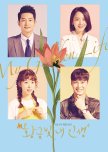
Weekend family drama, progressively challenging the concept of becoming/living as an ´adult´
“My Golden Life” is one of those KDramas that have been writing drama-history in South Korea. It is considered a 'national' series – popularity increased rapidly, the number of viewers doubled during the broadcast and towards the end, almost half of all nationwide TV audience during the weekends, while “My Golden Life” was broadcast, watched this series."My Golden Life" is a family drama, that doesn't just get lost in family clichés, Makjang and RomCom, but instead explicitly addresses some critical contemporary issues. Additionally, given attitudes and convictions are boldly deconstructed along the way. Thus, "My Golden Life" is a rather progressive family drama, involving also the 'quite new' concept of making personal life decisions despite (and in opposition to) family interests. In addition, more than one protagonist is questioning his/her life decisions or is forced to dealing with 'failure' (up to 'depression' as a result of learned helplessness), which is also quite progressive. Whether rich or poor, such issues likewise hit any income classes - in “My Golden Life”, too. In addition, there are current long-running topics such as the (lack of) work-life balance, discrimination because of social status, and the shame of divorce, as well as the increasingly sensitive issue of 'age'.
Ultimately “My Golden Life” is progressively challenging the concept of maturing in the sense of making my own, accountable decisions and thus becoming/living as an ´adult´. What does it mean, what does it need to be an 'adult'? ´Adult´ in the sense of having grown out of the familiar nest and being able to fly with my own wings? In the sense of being challenged to apply what I have learned in my own, individual manner? Is it allowed? Actually desired? Even wanted?
Notably gratifying and astonishing: Throughout the series, practically all of the divers family members go through their personal maturing processes against the background of various contemporary social issues. Many dramaturgical motifs may be familiar, but you can be sure that sooner or later everyone will be challenged with their attitudes and decisions being on trial. “My Golden Life” is not about stumbling through life with a social reptilian brain in obvious stimulus-response pattern. And it is not about by all means controlling the environment with the arrogant mindset of absolutist power fantasies. "My Golden Life" is intelligently and systematically deconstructing the usual set screws for critical life decisions (and dramaturgical plot developments.) In the end, almost every protagonist gets challenged and in the long run actually they all come to their individual, sometimes astonishingly mature, honest and even wise reassessments and re-decisions. This is (at least in this KDrama) possible, permitted, actually prerequisite.
Strikingly symbolic to deconstruction processes of social and individual assumptions throughout the story, ´gold´ is a metaphor for the estimation and valuation of an individual life. Its meaning and value is changing throughout the KDrama, parallel to the transformation processes of the protagonists... Most of the characters initially have the conviction that money (and associated with it: status) is the prerequisite or guarantee for happiness and a worthwhile, precious life... (as on the other hand the lack or loss of money is the reason or the cause of unhappiness and equivalent to a nugatory life.) However, most of them realize over the course of story that a ´golden´ life is not necessarily one that is successful, prosperous and meaningful because of a lot of money. In fact, an elitist, privileged life - being born with a ´golden spoon´ in the mouth - eventually comes with a ´golden cage´, too... Rather, a ´golden´ life is cordial, substantial and radiant with accountability and authenticity.
Within turbulent relationship dynamics (including a bit of Makjang-style topping when it comes to plot development) the 'impoverished middle class' and the 'dirty rich Jaebeol clan' are cleverly juxtaposed against each other, thus almost offensively confronting with the exaggeration of social class-affiliation and questioning traditional mindsets; additionally, full of wit contrasting submissive obedience and self-confident rebellion. Meanwhile, a dubious, arrogantly patronizing 'Noblesse oblige' virtue is craftily criticized, too.
“My Golden Life” is sometimes funny, sometimes intelligent, sometimes outrageously provocative, sometimes infuriating, sometimes emotionally serious, sometimes touching and sometimes downright grotesque. Being set as a family weekend drama, it is supposed to be easy to digest… yet, at the same time, the KDrama is consistently keeping its unabashed finger (gently, yet persistently) on the social scrapes, quirks and deep wounds, too. An astonishingly felicitous, ambitious balancing act. Overall, “My Golden Life” isn´t long-winded, even with 52 episodes. You may as well give it a try.
P.S.:
'Reassessment' seems to be the greater moral of the story.
Meaning: Traditional structures, rules, proven patterns and given orders may be all well and good. They may give orientation and set a direction in life. They provide a certain range of tools and know-how on how you can meet the challenges of life. But ultimately, in each individual case, it is still indispensable to carefully consider the appropriate application and decide for yourself what actually should be and could be accomplished. What is it, that I want? What is it, that I can do? What is it that I think is right? And what is it, that I am willing to supply?
At the end of education and apprenticeship usually there is a form of diploma or master's degree – not for mere copying, but for suitable, at best innovative application and enhancements. And in "My Golden Life" there are quite a few characters truly having earned their award... each in their own way. Eventually, it won´t do to simply adopt what others suggest, would have done or did before. It is all about individual solutions. Traditional lifestyles and attitudes are put to the test and are systematically deconstructed - voluntarily or involuntarily. In the end, the individually appropriate reassessment and authentically fitting solution does not necessarily have to lead to an easy or obvious decision...
"My Golden Life" is thus also giving a lesson in emancipation, too - in the original Latin and also in the more modern sense. Initially, Latin “emancipatio” was the “release of the son from paternal power”. In a broader sense: the child has grown or the student has been educated, so they can hold themselves accountable for their own life tasks and work obligations and thus take responsibility and reflect on their achievements accordingly. Additionally, in a modern, more general sense, emancipation is freedom from discrimination based on group, sex or class membership…
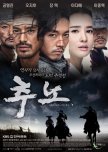
Tragic, epic, visually impressive.
"The Slave Hunters" is a cinematic-style KDrama, almost like a movie for the big screen. (It would definitely be an experience on the big screen.) In any case, "The Slave Hunters" has a lot to offer during ist 24 episodes.
There is strikingly selected staging of the landscape. Korea presents itself self-confident with its countless riverscapes and deltas, its mountains and coastal regions. The viewers visually accompany the protagonists on their long journeys across the country.
The accumulation of well-trained, well-structured torsos of the male actors is also characteristic for "The Slave Hunters". There's a lot of work involved, and it's appropriately staged here in numerous shots. Why not?
In connection with its sporty mimes, "The Slave Hunters" also comes up with a variety of brilliant, sometimes spectacularly choreographed fight scenes. Above all, Jang Hyuk once again sets quite a monument with his versatile martial arts skills.
The KDrama also presents - if you like - some Joseon-style parkour. 'Chase' thus gets a nicely invigorating touch. (Side note, in case you don´t know: Parkour is a special form of athletic movement art - a mostly urban steeplechase that has become fashionable in the last few decades. Individuals choose the most effective way to get to their destination, and that's hardly ever the predetermined path. Rather, the urban or natural landscape is re-perceived with regard to potential obstacles and evaluated as to how these can be creatively overcome on the individually chosen route, for example by jumping, somersaults or the like.)
The KDrama also stresses the subject of fatal love triangle in its complex emotionality. Eventually, there are also more love stories in the side plots. Yet, to be honest, the romance aspect should not be your reason to watch... The complicated dynamics might drive you crazy at times, so does the rigid play of the ex-and-again-general.
After all, the story mixes a good pinch of humor with profound wisdom. Surrounded by all the muscle-packed, fast-paced spectacle, the question of how a just society can be achieved is examined, i. e. whether it can ever be achieved at all. As soon as people gain power, won't they always tend to turn their fellow human beings into slaves, chattel or lackeys? And: will a changed political system change the people? Or do people have to change for the system to change? As a premise it is stressed that slaves are also human beings, e. g. that it actually starts with an attitude, that one should not deny any human being to being a human being - certainly not according to their genetic origin. "Slave Hunters" historically refers to the beginning of socio-critical Yangban movements against practiced slavery.
At the same time, the KDrama shows life under simple/poor living conditions - unembellished in all coarseness, e. g. ugly, blustering, brutal, unkempt and uneducated, but still warm-hearted. On the other hand, the fine silk clothings and the well-groomed, educated demeanor of the nobles and officials cannot hide their emotional coldness and corrupted souls.
All in all: It is not surprising that the KDrama in average thrilled more than 30 percent of the South Korean population and received numerous respectable awards and even international nomination. Above all, Jang Hyuk, for whom his role seems to be tailor-made. He fights, jumps, sprints, barks, laughs, cries, digs into the deepest depths of his soul and on top of that presents profound street smart and wise philosophies.
"The Slave Hunters" has a charm of its own. It´s tragic, epic, visually impressive.
---------------- Side Note: --- historical background ----
The historic frame refers to the time of King Injo in the 17th century as well as his son and Crown Prince Sohyeon. As a result of the submission after the second Manchu invasion in 1636, the Crown Prince (together with his wife and other officials) went to Shenyang practically as a hostage of the Qing. He spent his time there working diplomatically on peaceful relations between the Joseon and Qing dynasties.
His commitment also brought him to Beijing, where he became familiar with Western culture through his acquaintance with Jesuit missionaries. However, his father did not like Sohyeon's diplomatic commitment and open-mindedness at all. He feared that after his return and accession to the throne, he would want to reform Joseon with Catholicism and Western values. Prince Sohyeon's sudden death is interpreted by historians as deliberate poisoning. There is some evidence that his own father was behind this. Sohyeon's wife was executed for treason and only the youngest of his three sons survived their exile on Jejudo.
---------------------------------------------------------------------
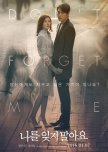
A love story, that is told in a completely unorthodox way. Impressive in a refined manner
Capturing so much feeling quite sensitively and lifelike, “Remember you” is definitely for KMovie connoisseurs - with a memorable story and two wonderful leads deeply touching the audience's soul.However, the story is not at all concerned with meeting common audience expectations. The KMovie chooses its own pace while poetically linking the loose threads into a three-dimensional pattern – in a stringent but by no means linear manner, purposefully but without any haste.
“Remember you” (or rather “Don’t forget me”, as the original title says) is mostly a love story through and through. However, it is a love story, that is told in a completely unorthodox way.
The past that lies behind – with the memory of it having the potential to ripping emotional abysses with brute force. The future, that lies ahead – with hope dwelling inside. The present – in which the ´now´ can become a safe zone. Within and throughout: the transcendent power of love.
There is something meditative about “Remember You”. We´re stumbling alongside the amnesiac protagonist through his (to him) strange present, with people coming and going. It almost feels like in a dream. He acts on the outside while inwardly commenting and silently asking his questions to an inner authority that should know... But the inner authority is mute.
The memories of the male protagonist, who suffers from amnesia, come back in fragments and immediately collapse again. The soul has found its own ways in dealing in a somewhat more bearable way with an almost unbearable reality. But ultimately, this situation, too, still is not really bearable either. The KMovie portrays a desperate psychological wrestling with reality - of the male lead on the one hand, and the female lead on the other.
Before we notice it, at the latest as soon as the puzzle has been put together, we suddenly find ourselves very close to the no less desperate inner world of the female lead. After being very close to HIM for so long and learning to feel with HIM, we suddenly find ourselves compassionate with HER emotional horror trip...
Impressive in a refined manner!
PS:
The KMovie “Remember You” is based on a short film by the same director. Based on this template, crowdfunding was used to raise funds for an international independent cinema film production. $32,000 was donated for this purpose. When it premiered in South Korea, “Remember You” grossed around $2 million already.
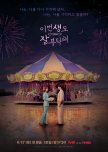
Charming hanger, to tell the same old story about Cupid's arrow in a refreshing crisp new way
"See you in my 19th Life" is first and foremost a love story. However, there is this particular, dramaturgically appealing impulse, since the protagonist has been incarnating on this planet again and again since 980 AND is actually able of recalling all of her 19 multifaceted lives so far quite well. So the protagonist is neither ghost nor demon, but a human being like you and me – only with more knowledge and experience from her previous lives with different gender. She brought all she has ever learned and known along with her.A nice hanger, I think. A great (not necessarily brand new, though,) idea to tell the same old story about Cupid's arrow in a refreshing crisp new way. The idea goes back to a web toon. As tvN-KDrama it comes along in 12 episodes. Here Shin Hye-sun once more took the chance to break down female stereotypes, as she had already successfully stirred up gender-specific behavior patterns with her acting in "Mr Queen". Wonderful.
I think the concept overall works very well. The KDrama presents a Rom+Com in a light-footed pace. However, the protagonists certainly have their bags to carry. So the story doesn't just sail along on the surface. And then, of course, there are also mischievous characters, e.g. in the Jaebeol milieu, adding some extra excitement. In addition, the subplots are quite elaborated in a charming manner, too.
So: If you're in the mood for Rom+Com, you'll be well taken care of with this KDrama. The story draws with pleasure from the large pot of possibilities that arise from the idea of awareness in reincarnation, thus lovingly spicing up a solid love story. Predictable it may still be, yet it is fun, heartwarming and including some surprising twists, too.
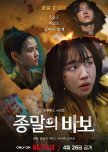
Slow paced & soulful slice of life - HOW we are living being more important than surviving
Beforehand: Anyone who expects "Goodbye Earth" to be a 12 episodes long doomsday blockbuster in the face of an impending apocalypse is completely wrong here. The KDrama has nothing to do with a fast-paced, action-packed and adrenaline-arousing desperate fight against an approaching asteroid.Plus: Yoo Ah-in's lead role, due to a charge of illegal drug use, was reduced to a minimum during production. So somehow it had to be improvised in terms of content. But in my opinion, a stronger focus on the female lead (played by Ahn Eun-jin) didn't hurt.
I would say "Goodbye Earth" is a ´slice of life´ centering around a bunch of rather ordinary people in a rather ordinary residential area in the city of Ungcheon. The remaining city population is expecting the crash of an asteroid that is on a collision course with the Earth and, according to calculations, will hit the Korean peninsula. Other than that, people live their lives - which, compared to before, obviously are not quite the same... So this dystopian KDrama is not about averting disaster. It's about continuing with life - until the end. Together. But, now, what do all the noble, dutiful, corrupt, holy, street-smart, arrogant, simple, life-hungry, in love, pregnant, believing and criminal variations of human beings do with this knowledge of their collective death?
Significantly, the looming asteroid isn't the worst thing at all in “Goodbye Earth”. In this particular scenario, the political order had already largely collapsed. Those who could afford it, had tried to save themselves. Eventually, the power vacuum was filled in no time. But fortunately, "Goodbye Earth" does not medially exploit the dystopian scenario to gleefully indulge into man's cruelty, unscrupulousness and insatiable greed even in the face of the bitter end. In fact, the KDrama gives its time and space mainly to interpersonal dynamics of a certain community - a diverse collection of people, young and old, who know each other from their community life, from school, from childhood. Only over time, little by little, in interspersed flashbacks, do we find out how they are all related to each other and what actually connects them. We walk along with them - during their last days, which are unstoppably shrinking in number… until the collision with the asteroid. Thus, emotionally, episode by episode, we get to know the people and their neighborhood better and might even grow fond of them, too.
The people in Ungcheon are actually less concerned with the approaching asteroid itself than with why and where their priest had disappeared or what had happened to the church money. And then there is this gang of criminals who among others specialized in child trafficking. The pain, fear and hopelessness felt by the people of Ungcheon is more likely to be caused by the collateral damages beforehand of the asteroid collision, than by actually facing their end.
It is slice of life in the context of a rather bizarre, extraordinary life situation. While people have to process their traumatic, crucial life experiences, talking and sharing might actually help to overcome emotional alienation or even frenzy. Yet... This is beautifully demonstrated in several examples. Sooner or later, close to the end the question arises as to what really counts...
In my opinion, this is a quietly gripping and complex KDrama. So complex that a few questions might remain unanswered at the end. But for me they are not so important here, therefore I can leave it at that. I´d say “Goodbye Earth” is rather about the personal processes that all those different characters have to go through, while dealing with those obviously extraordinary challenges their ordinary life is confronting them with.
For all those who expected e.g. “Deep Impact” in a series format, "Goodbye Earth" is certainly disappointing. For fans of slice of life, however, an almost unique scenario opens up in this rare dystopian context. The focus is on a former teacher who had to helplessly watch the children of her mid-school class becoming the greatest collateral damage in the run-up to the asteroid collision. For her this is representing the actual catastrophe.
"Goodbye Earth" lives from subtle interpersonal dynamics, coping with everyday life in a state of emergency and the daily struggles for emotional balance, for humanity and structure, for law and order in the midst of chaos. The KDrama is primarily a soulful and slow-paced study about the people of a neighborhood in Ungcheon bravely continuing with their lives in the light of their definitive collective death date. Because it's not over yet. Well aware about day X, life goes on. Until then. Together.
Bottom line: In the end, HOW we are living is more important, than surviving no matter what.
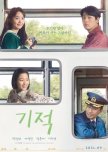
A lovingly told, soulful story based on true events. 117 uplifting minutes that´ll bring you joy
"Miracle: Letters to the President" comes across as a wonderful fairy tale. And yet it isn´t. The story arose from harsh reality. "Miracle" is a soulful KMovie about dreams come true, bathed in the bright colours of the four seasons in a remote, idyllic mountain valley. This landscape is a crucial player in its own, thus impressively contributing to the whole plot. Actually, a handkerchief or two might be helpful, even though the KMovie isn´t particularly playing on our heart strings. It's just a touching story, lovingly told.The setting of this true story: a remote mountain village in the east of the country, that can only be reached via the trass of the railway line. However, it does not have its own train station. For the residents, this means that they have to put up with an arduous walk along the trass in order to get to the next village as quickly as possible. For example, the protagonist spends five hours each day commuting to and from school. And quite a few people have already lost their lives on this dangerous walk over this busy trass through the mountains – including the mother of the protagonist. The boy's dream: a train station for his village. The chances are low, but he does not give up.
It may help that he actually seems to have a special talent for science. Also it may help that in Rah-hee, a bright daughter from an influential family, he finds a school friend and at the same time his muse, always encouraging and inspiring him in her idiosyncratic way. Thus, "Miracle" is also a tender, unusual love story with the charm of the 1980s.
So there are wounds and wonders, as well as wonderfully staged images, yet with a challenging core. All in all, a lovingly told, soulful story based on true events. Nostalgia of the 1980s, picturesque nature and rustic mountain idyll, the slower pace of provincial life and spectacular railway lines through tunnels and over bridges in the steep foothills of the Taebaek Mountains convey "Miracle" its distinctive character. The KMovie is bathed in an all-round positive aura. 117 uplifting minutes that´ll bring you joy.
-------------------------------------------------
SIDE NOTE: --- Yangwon Train Station ---
Socheon-myeon is a mountainous area in North Gyeongsan, in the east of the country.
The Korail Yeongdong Line crosses this area on its way from Yeongju in North Gyeongsang Province via Taebaek Mountain to Gangneung in Gangwon Province. Since 1988, the Yangwon railway station has been the smallest and also the first private railway station in South Korea. Until then, the village was isolated from the rest of the world in the middle of a rugged valley. Even though a railway line had passed the village since 1955, the train had never stopped. There was also no road leading to the village. 3.7 km of railway line separated the villagers from the nearest Seungbu railway station and thus connections to other towns and cities. With ax, shovel, mortar and sweat, the villagers finally built their tiny train station themselves.
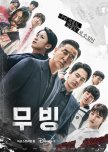
A blockbuster among Disney+ Series. Action driven, yet luckily with subtle character portraits, too
"Moving" is about people with superpowers. “Moving” tells the stories of a variety of people with such superpowers. These superpowers definitely belong to the realm of fantasy. However, it´s nothing like the 'Marvel' universe, because despite all the action spectacle that "Moving" has to offer, this Disney+ production (based on a successful South Korean webtoon) remains true to the KDrama habitus, that life takes place in the area BETWEEN black and white. It's about shades of gray. Nobody is exclusively good or evil. Well, almost nobody...“Moving” takes aim at South Korea’s intelligence policy. The KCIA, which became the ANSP and was eventually called the NIS. The connections with the USA and the difficult relationship with North Korea come into play. Difficult, because even within the framework of an official sunshine policy, distrust and hostility are always maintained in the background.
The South Korean secret service has been part of the international elite since the KCIA was founded. The superpowers of the protagonists may be symbolic of this. The name of the secret service has changed several times, as has its official focus. However, this does not mean that the entire workforce can be replaced...
“Moving” finds its balance between political thriller, action thriller and emotionally differentiated Korean habitus. The trick: the tough agents become humanly tangible because they are also parents, worried about their children. And then another trick: the children have inherited their parents' super-powers, but have not (yet) undergone any agent programming. They are children, still relatively naive, pubescent, too...
Worlds collide. The worlds of those, who behind the curtain want to move the world in their favor (for the sake of so called bigger picture and a safer world), the worlds of those executives, more or less blindly obedient (Black Ops) agents who are needed to succeed with their missions, and the world of those, who actually make this world worth living - people with their ordinary families and social relationships.
“Moving” has 20 episodes. Numerous character and relationship portraits are drawn, all of which are somehow intertwined - the old and the young, yesterday and today. And finally altogether now for a tomorrow free from deadly intelligence agency demands.
“Moving” is, first and foremost, a KDrama with a top-class casting that aims to offer streaming delight at the highest international level. “Moving” is explicitly seen as a kind of blockbuster among Disney+ series productions - with a correspondingly hefty budget. As such, the series has entered the streaming market in a self-assured manner and immediately achieved remarkable success worldwide...
However, for my personal taste, this KDrama comes across as a bit too action driven and brutal - with those superpowerful men and women, who (despite their deadly wounds) keep bouncing back again and again and again... I might have dropped it, if not for this variety of subtle and affectionate character portraits, that make a great part of the story, too.
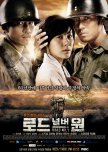
Romance & Bromance at its best in (still warlike) post World War II years on once Joseon´s soil
"Road No. 1" is an intriguing KDrama that takes a close look at the (still warlike) post-war years in Korea after 1945. On impulse we might think of the Korean War of 1950-53, but for the Korean people the struggle between North and South began much earlier (see below if you like).There are definitely plenty of tragic fates and stories to tell from that time. "Road No. 1" is one of them, splendidly captured within 20 episodes full of human struggle for life and love. Here you will find romance and bromance at its best. Emotively staged against a backdrop of uniforms, guns, grenades, explosions, barbed wire, the 38th parallel and Road No. 1.
------------------------------------------------------------------
Side Note: ---- HISTORIC BACKGROUND ----
The 'No. 1' is the road that connects Seoul and Pyongyang - after the end of World War II in 1945, these were the two largest cities in Korea, having been annexed by Japan since 1910 as the Chōsen province. After the surrender of Japan, the province of Chōsen was (like Japan itself) occupied by the Allies. The Soviet Union and the USA, as trustee administrators, had divided the country along the 38th parallel into two occupation zones. In fact, the Korean people weren't too keen on (again) not being given state sovereignty.
With the departure of the Japanese, the struggle for the future of the country began - a struggle between different visions and perspectives. The allies favored the political positions they liked - e.g. Joseph Stalin and Mao Zedong with Kim Il-sung a communist state in which only one politically active party should exist; the USA a Western-style constitution for the South with a Christian-capitalist orientation. However, there actually was also a nationalist, anti-foreign grouping within the country that (by tradition) particularly opposed the American occupation and its Western values. They engaged in a guerrilla war that began as early as 1946. That is, where "Road No. 1" has its roots and starts off. And that's a good thing, because this aspect is sometimes lost in the historical representation of the western hemisphere...
This resistance struggle´s position was much closer to communist ideas than to the western value system, which still seemed rather foreign up to that point. Just because the former colonial ruler Japan was one of the losers of war, the former Joseon doesn't have to be happy to make a 100° about-face towards Western democracy... What the country or its people wanted was actually not seriously considered. The promised election did not come about. It simply fell underneath the wheels of the Cold War. For the Soviet Union and the USA, Korean policy was based on post-war events and global political muscle flexing. However, for the Korean people, who had never been never tired of resisting oppression under colonial rule, things just kind of went on. From the rain in the eaves...
--- People's Republic of Korea - a non-starter ---
In fact, it completely escaped my historical knowledge that BEFORE the division into a communist North Korea (Democratic People's Republic of Korea) dominated by the Soviet Union and China plus a South Korea occupied by the USA (Republic of Korea), there had also been a KOREAN vision for the future of the peninsula. After Japan's capitulation, the 'People's Republic of Korea' (NOT EQUAL to the Democratic People's Republic of Korea alias North Korea) was proclaimed as a provisional government on September 12, 1945 for BOTH zones of occupation. Initially, the basis of the new constitution and government was supposed to be created from a network of people's committees. The program was radically social. The aim was to establish Korea's complete independence and a democratically governed public life for a free people.
In the north, the People's Republic was taken 'seriously' by the communist occupiers (effortlessly, so to speak, due to the similar attitude). In the south, however, the military controlled political events were based on a rigorous anti-communist attitude. Of course, the USA did not like this communist-affine new political perspectives towards the peninsula at all. In 'their' southern provinces, they even went so far as to ban the ´People's Republic´ (purely because of its communist ideas). This fueled resentment... and there it was again: resistance.
--- National Uprising ---
In 1946, the so-called Autumn Harvest Uprising marked the beginning of public, sometimes massive, resistance, which took on further forms in 1947 and finally culminated in a national uprising in 1948. The USA had to react quickly and so they sponsored the lesser evil: the elections for the first 'Republic of Korea' in August 1948: the autocratic Rhee Syng-man. Although he was not in principle friendly to the USA, nor was he an enthusiastic democrat or even an advocate of human rights, he was opportunistic enough to also cooperate in the interests of the USA. He was also anti-Japanese and anti-communist. South Korea was given a Western-style constitution, and from then on it had to be guided by Christian and capitalist values. Of course, after the South voted, the North had to follow suit (with the formation of the DPRK).
The Korean people were thus separated - politically, geographically, economically and socially - and had been incited against each other by propaganda and degraded to the pawn of global political muscle flexing. Industry, resources and energy supply were concentrated in the north, while two-thirds of the 30 million Koreans were living in the south. And they initially fought against the paternalism of the American military. Between 1948 and 1950, guerrilla fights against the South Korean Republic's military and police cost the lives of around 7,500 official security forces and around 34,000 civilians - even before the actual Korean War even began. The people strived for unity. But politically there was only an either-or (communism vs. ultra-nationalism).
--- Korean War with international participation ---
In 1950, Kim Il-sung made use of the situation in the south as well as of his military and material superiority. He wanted unite the country in his interests (and under his constitution). Rhee Syng-man had his military resist as best they could until international intervention by the UN led by the USA actually pushed back the North Korean army. However, in view of the new situation and the global dimension, China rushed to North Korea´s aid. There was fierce fighting, on land and at sea. At the end, the armistice, which is still in force today, includes the concession against the background of the Cold War that there will still be the Republic of Korea in the south and the Democratic People's Republic of Korea in the north.
After ca. 2 million civilians, around 1 million Korean and Chinese soldiers, as well as ca. 40,000 UN soldiers having given their lives to this war, everything remained just as it had been before. In sum: A divided country that had been cheated of its autonomous sovereignty. Patronized Koreans. A people with split identity. Separated families.
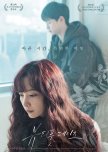
Intensive. Rough. Monosyllabic. If you don't let that put you off: Definitely worth seeing!
On average, every month (!) around 1,000 North Koreans flee to China in the hope of thus escaping hunger and persecution. Around 80 percent of the refugees are women. In many respects they are dependent on their unfamiliar environment - due to the uncertainty regarding residence law they practically live in a legal vacuum. Their fate all too often ends in the hands of smugglers and human traffickers who shamelessly exploit their insecure situation and ruthlessly make use of this for their own profit. The women are kept in brothels under slave-like conditions or forced into marriage. The bribes are increasing in view of tightened border controls. And unfortunately, China delivers all the refugees it identifies as such back to North Korea, where they then await torture and death. They live in constant fear of attacks, violence and deportation."Beautiful Days" tells the true story of a North Korean woman who makes it out of fear and dependency into an independent identity and a new life in South Korea. Her new life not rosy either, but it's free and self-determined.
Lee Na-young convinces here in a true-to-life and unembellished depiction of a bitter, merciless development process - from the abandoned teenager, who is forced into sex work and marriage, who is then threatened with taking her child away to sell it, and then despite all the hopelessness, persistently and unswervingly manages to escape her pimp, emancipate herself and earn enough money as an independent woman to support her family in China from afar.
By the way: In "Beautiful Days" there are actually no "beautiful" days. The title is pure irony. Dialogues are minimized. There is hardly any room for closeness and tenderness in this rough, monosyllabic world. The few loving gestures can practically be counted on one hand, but their effect is thus even stronger.
Intensive. Rough. If you don't let that put you off: Definitely worth seeing!
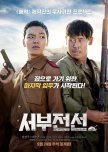
Tackling the horrors of war and the absurdity of the Korean War in particular with grotesque humor
"The Long Way Home" – original: "Western Front" - is a KMovie about the Korean War. But a funny one... if a movie about war might be called funny at all... In fact, it succeeded brilliantly in tackling the horrors of war in general and the absurdity of the Korean War in particular with grotesque humor.As a last resort, even a North Korean student is drafted to drive a tank into battle. A South Korean farmer, in turn, has to leave his heavily pregnant wife behind in order to take part in an all-important, top-secret mission and deliver strategically important secret information to the Allies. Neither are heroes. Neither of them would actually care about the war. But both have dutifully learned the ideological phrases of their 'side' and both, quite by chance, are the only ones in their respective units to survive in an airstrike three days before the truce is signed. The North Korean incidentally stumbles upon the top secret paper and hides it. The South Korean incidentally overwhelms the North Korean... obviously, neither of them being born to be soldiers.
"The Long Way Home" is a kind of road movie back and forth through the empty landscape of the western front line. The student from the north wants to return home with his tank. The farmer from the south, in turn, wants to hand over the secret paper so that he can finally return to his wife and newborn baby. Eventually, sometimes one pulls in this direction and then the other one in that. Only a cow is involved, too. And a bizarre village community in no man's land. Along the way, the two squabblers also stumble upon Chinese troops reinforcing the north, and there is also another airstrike from the south. Then, again and again the cow in the vastness of the natural landscape, in which military equipment and soldiers don´t seem to fit in at all. The war is increasingly losing its meaning and significance. The tank has long been junk anyway, but ironically it becomes their shared cozy home. Enmity becomes friendship. War is crap. This one anyway! Regarding its fatal futility and arbitrariness, the KMovie in conclusion actually goes one better, too.
In "The Long Way Home" infernal war scenarios and powerful chamber drama collide with slapstick and situational comedy. A daring mixture, but quite successful not least thanks to strong mimes - with young talent Yeo Jin-goo and veteran Sol Kyun-gu in a fantastic playing mood.
A different kind of anti-(Korea) war movie.
Not a milestone in cinematics, but quite entertaining in its bizarreness.
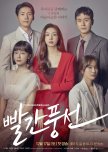
about the ´art´ of becoming an egoist
You may consider "Red Balloon" being one of those family makjang stories that come up again and again in different versions in KDrama-land. Tangled ties of fate and trauma that continue to get even more tangled and traumatizing. You might think “Yeah. Makjang again. Family drama again. Forbidden love again. Ok, you´ve seen it all. You don´t need another one.” So should you watch? You definitely don´t have to. But oddly enough: you may want to. The characters, with all their sometimes almost disturbing ambivalence, drag and pull you under their spell. Subtly, unperturbed, whether we're watching or not: they are struggling to function and survive within their dysfunctional relationships and families... and on top of it: they are even longing for far more than that.2022/23 "Red Balloon" infiltrates South Korean homes as the red-hot contemporary document of a complicated ordeal, which society increasingly has to deal with. On the one hand, family is regarded as the highest value in society. On the other hand, within the last decades national divorce rate has reached the tops in worldwide comparison. Yet, divorce is still seen as a shame – a topic for ´other´ families only (if at all). Nevertheless, more and more South Koreans are choosing this path, even the 'elderly' (those over 60 and even over 70) are increasingly opting for divorce. The KDrama juxtaposes the hardened socio-cultural fronts within a fictional story that listens to both sides equally, gives space, allows themselves to be rubbed against each other – sometimes loudly, sometimes violently – and struggles to find solutions.
Throughout the KDrama, events and emotional ordeals continue to get worse. Seasoned with gradually increasing makjang tension, with complex personality portraits, as well as poignant, excellent pleas (sometimes for one, sometimes for the other and sometimes for yet another position), the KDrama screws itself deeper and deeper into the increasingly heated minds of the audience. "Red Balloon" succeeds excellently in taking its often head-shaking viewers into truly impassable, controversial socio-cultural terrain and, with the concentrated confrontational dramaturgical charge of emotional ambivalence, exemplifies what would be, could be, yet must not be, however wants to be possible, (and after all IS possible in South Korea 2022/23).
There are multiple storylines that are heartily intertwined. But they all deal with the same topic: the critical fine line between a so called ´satisfied´ life (as one normally lives / should / has to live / pretends to live) and a self-abnegating, self-deceiving ´dissatisfied´ life; the latter mostly going unnoticed, though, because actually everyone lives that way and it seems to be the most natural thing in the world... Dissatisfaction only becomes critical, if someone can no longer ignore that this supposedly ´satisfied´ life is actually a 'dissatisfied' one. The subtle psychological tension of the KDrama emerges in the conflict between traditionally unquestioned, accepted customs and the individual urge for deviation, which (here) rages more or less intensely in almost all of the protagonists, and erupts in an attempt to break free. Daring to dream, being honest with oneself and eventually even making the necessary efforts... but, alas, also being sincere in respect to the social environment? Ready to disappointing the expectations of others? Prepared to missing duties and responsibilities? To hurting loved ones, too? Has actually anyone ever honestly tried to truly walk along his/her individual path sincerely upright? (At least when it comes to South Korea 2022/23, so far there are hardly if any role models whatsoever.)
"Red Balloon" can be considered a social study using the example of the microcosm of three families, that are connected, among others, through a (not quite balanced) childhood friendship between two female protagonists. Yes, one could bitch and nag about prevalent adultery among the protagonists. On the other hand, in this case I´d like to set a different focus, that is: Collectivism in conflict with increasingly burgeoning individualism. Against this background, it is more about the 'art' of becoming an egoist. (See side note below). In a society shaped by collectivism, social class and hierarchy like South Korea, 'egoism' (=standing up for individual needs, even in the face of social pressure) has so far not been a quality in itself. On the contrary. The development of such an independent and socially recognized value is in its infancy there. The protagonists are correspondingly insecure and sometimes stumble, doubt themselves, look for a turnaround and reflect on the old values... which include: doing what other, older, financially better off fellow human beings say, want, demand. (And thus, often enough being humiliated, too. A life full of sacrifice, humiliation and shame is quite normal. Most people live that way. Accordingly there is nothing wrong with it, right?)
Shameless adultery might be one side of the medal. The other side, however, represents the widespread, customary long ignored individual dissatisfaction for the sake of ´the group´ (family etc.) that some can no longer cope with. The KDrama team draws memorable portraits of people at different ages, who have their quirks like anybody else. At some point, they try to stumble free from the expectations of others and rather follow their gut. They want to, and choose to live up to their own desires... struggling, staggering, falling in the face of the mercilessly blowing headwind. There might be an urge to break free of a tight corset of expectations and obligations – yet, just daring to think in this direction is considered shameless and despicable... Sympathy for family struggles, sacrifices, deprivation and suffering, on the other hand, is widespread, because this individual pain results out of self-sacrifice for the 'group' and in this case is downright virtuous. (The KDrama Orbit has told countless stories of this virtue since the earliest productions.) Sympathy for 'individual' pain however, e.g. suffering from the group pressures and demands, is hard to find. With a newly found egoism and its associated pains one is left alone... Well, has been, so far. Not anymore. This is where "Red Balloon" comes in… at least with an example of role models on fictional playground.
With its tricky, controversial topic, the KDrama hits the mark of many minds in the country. The audience of "Red Balloon" had quickly doubled and after half of the 20 episodes even tripled. Eventually, for the audience throughout the rest of the world it offers plenty of KDrama-Quality, too.
--------------------------------------
SIDE NOTE: --- Life satisfaction in South Korea ---
The latest data on quality of life, published by the Republic's statistical office in 2022, ranks South Korea 36th among the 38 OECD countries. (Only in Turkey and Colombia life satisfaction is worse.)
What feels like exaggerated makjang for some (especially for audience with nationalities of the other 35 member states) is pretty close to everyday life for many (South Koreans) sitting in front of their home TV...
------------------------------------------
SIDE NOTE --- The ´art´ of being an egoist ---
In 1976 the book “The Art of Being an Egoist” by Josef Kirschner was published. In it, the author works out the necessary, ambiguous psychological process and the stamina, the required perseverance, you need regarding individual (=egoistic) life decisions that are geared towards personal needs (=against the interests of the community/group/family). Self-love is a crucial step towards accountability (vs. behaviour determined by others) and thus forms the basis for free, responsible, caring citizens. However, even after all those centuries, egoism is (still) widely devaluated in individualistic Germany/Europe, too.
That´s because, egoism and the group are generally at war. The more submission the family/group/society structurally expects of its members, the less space individual needs have and the more shameful and banished they are. The protagonists in South Korea 2022/23 (which is characterized by collectivism and has a strong hierarchical structure) have to deal with just this problem. The theme here is the struggle for a psychologically healthy egoism for one's own good. The thesis behind: Honestly towards myself and content, I am able to approach others sincerely and freely give of myself, contribute and care about others. That´s because I want to. Not because I have to, (even though I feel wronged, indigent or missed out.) I care for myself. And then, additionally, I can truly care for others, too. Like the sign in the airplane says: you should put your oxygen mask on first before trying to help the person next to you…
PS:
(This 'egoism', which is based on self-love and mature personal responsibility, should not be confused with insatiable, ruthless and mostly immature greed. KDrama-orbit is full of greedy contemporaries, because unfortunately greed is cross-culturally human and can thus be found all over the world. Greed has no social component. With greed, nothing positive flows back into the group.)
--------------------------------------


 9
9 38
38 15
15















